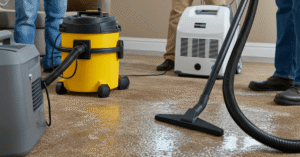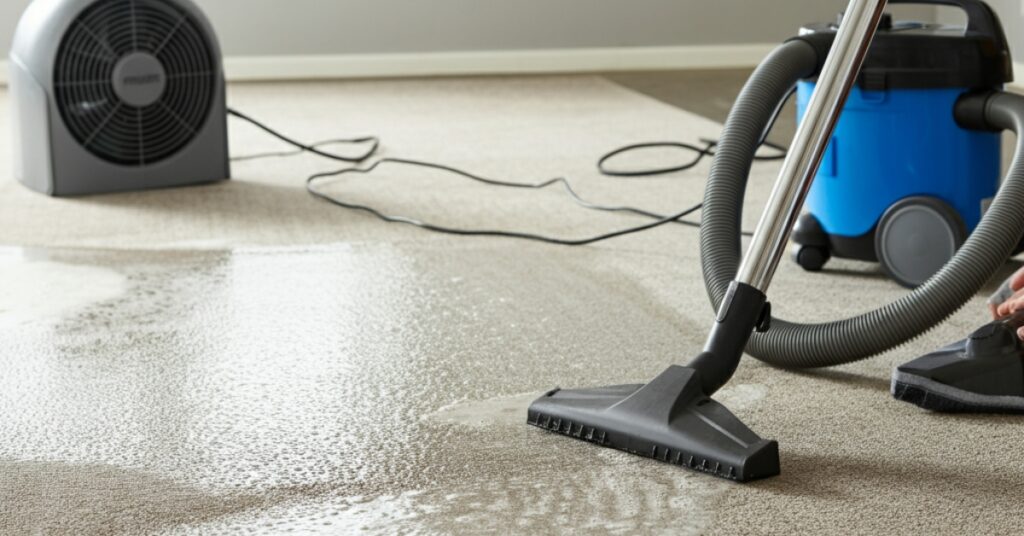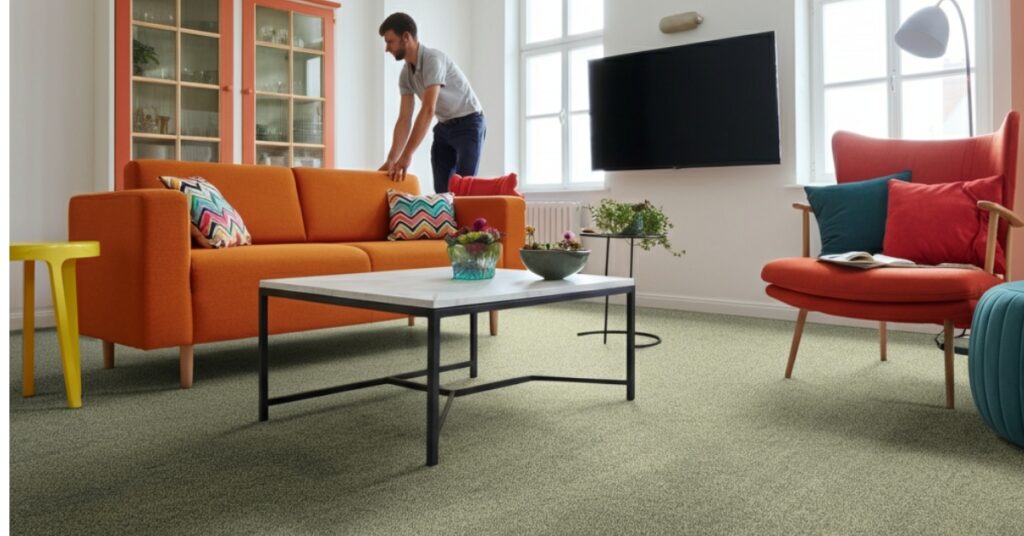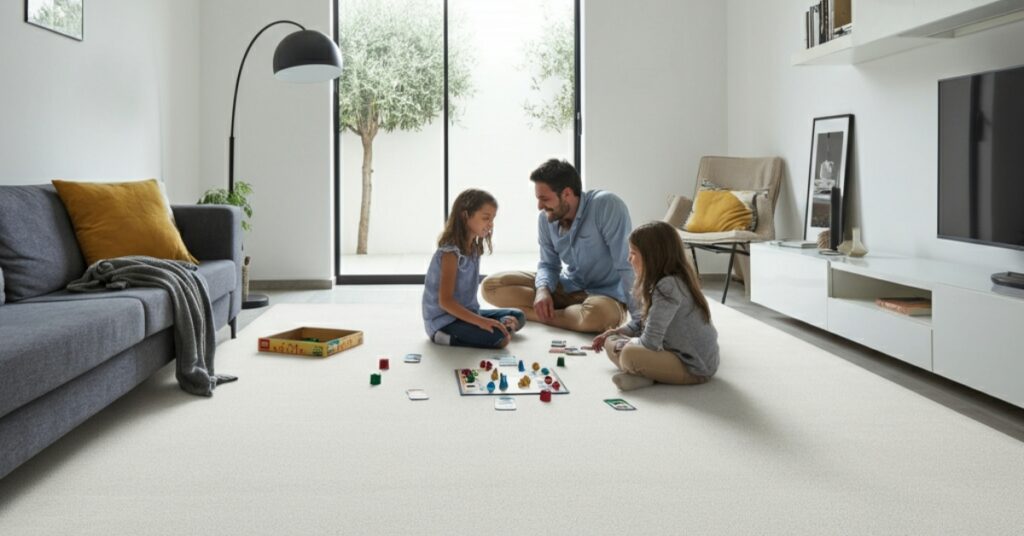As an Amazon Associate, I earn from qualifying purchases.
Deciding to upgrade your home’s flooring from carpet to hardwood is a major investment. Knowing how much it costs to replace carpet with hardwood is the first step in planning your project. The total expense depends on a variety of factors, including the type of wood you select, labor rates in your area, and the size of your space. This detailed guide breaks down every expense so you can budget accurately and make an informed decision for your home.
This project involves more than just laying down new planks. You need to account for removing and disposing of the old carpet, preparing the subfloor, purchasing the new hardwood, and paying for professional installation. On average, homeowners can expect to pay anywhere from $7 to $25 per square foot for the entire process. For a standard 200-square-foot room, this translates to a total cost between $1,400 and $5,000. Understanding where these costs come from will help you navigate the process with confidence.
Breaking Down the Cost to Replace Carpet with Hardwood
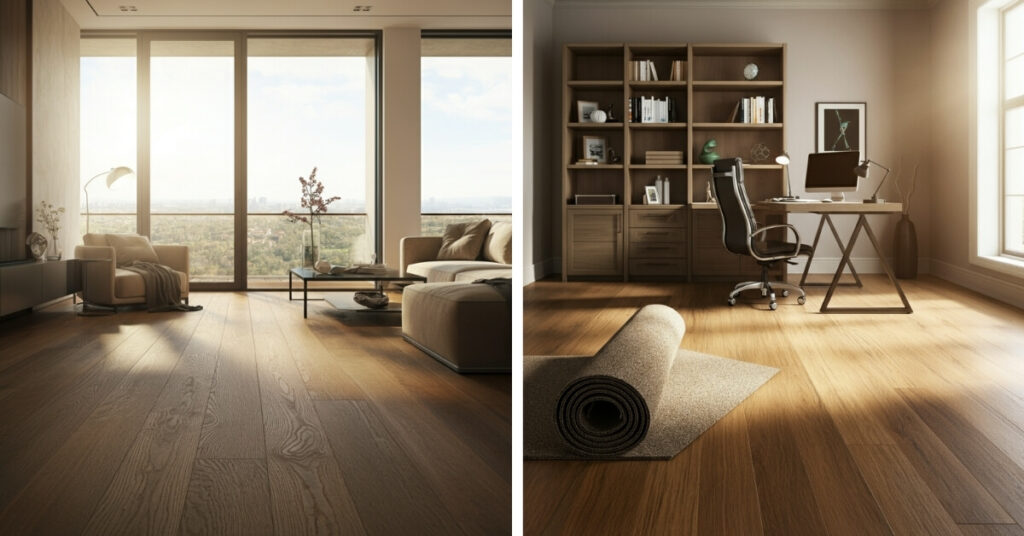
The final bill for replacing your carpet with hardwood is a combination of several key expenses. Materials and labor are the two largest components, but other factors like carpet removal and subfloor preparation also play a significant role. Let’s look at each element in detail to see how they contribute to your overall budget.
Each stage of the project has its own associated costs. By understanding this breakdown, you can identify areas where you might be able to save money, such as by handling the carpet removal yourself. Moreover, a clear budget helps you compare quotes from different contractors more effectively and ensures there are no surprises along the way.
Cost of Removing Old Carpet
Before you can install beautiful new hardwood, the old carpet must go. Most flooring contractors include carpet removal and disposal in their overall quote. This service typically costs between $0.50 and $2.00 per square foot. The price can vary based on whether the carpet is glued down or installed with tack strips, as glued-down carpet is more labor-intensive to remove.
If you are looking to cut down on costs, removing the carpet yourself is a manageable DIY project. You will need a few basic tools, such as a utility knife, pry bar, and pliers. However, keep in mind that you will also be responsible for disposing of the old carpet and padding, which may involve a fee at your local landfill. For many homeowners, the convenience of having a professional handle the removal is worth the extra cost.
Subfloor Preparation and Repair Costs
A solid and level subfloor is crucial for a successful hardwood installation. Once the old carpet is removed, your contractor will inspect the subfloor for any damage, such as water stains, rot, or uneven spots. Minor repairs, like securing loose plywood sheets or filling small cracks, are often included in the installation cost.
However, if significant repairs are needed, the cost will increase. Replacing sections of damaged subflooring can cost $2 to $7 per square foot, depending on the extent of the damage and the materials required. If the subfloor is uneven, it will need to be leveled, which can add another $2 to $5 per square foot to your project cost. Skipping this step can lead to creaky floors, gaps between planks, and other issues down the line, so it’s a necessary investment.
Analyzing the Cost of Hardwood Flooring Materials
The type of hardwood you choose will have the biggest impact on your total project cost. Hardwood flooring is available in a wide range of species, finishes, and plank widths, each with its own price point. Understanding the differences between these options will help you select a floor that fits both your budget and your home’s aesthetic.
From affordable engineered wood to luxurious exotic hardwoods, the material costs can range from as little as $3 per square foot to over $15 per square foot. It’s important to balance your desired look with your budget. Remember to also factor in the cost of underlayment, which provides a moisture barrier and sound insulation, adding another $0.30 to $0.75 per square foot.
The Price of Different Hardwood Species
The species of wood you select is a primary driver of material costs. Common domestic woods like oak, maple, and hickory are generally more affordable, while exotic species like Brazilian cherry or tigerwood are on the higher end of the price spectrum.
- Oak: As one of the most popular choices, oak is known for its durability and classic grain pattern. It typically costs $4 to $9 per square foot.
- Maple: Maple is a hard, dense wood with a light, uniform appearance, making it a great choice for modern interiors. Expect to pay $5 to $11 per square foot.
- Hickory: Known for its rustic look and exceptional hardness, hickory is a durable option that costs between $5 and $10 per square foot.
- Exotic Woods: Species like Brazilian walnut or teak offer unique colors and patterns but come at a premium price, often ranging from $10 to $20+ per square foot.
Solid vs. Engineered Hardwood Costs
Your choice between solid and engineered hardwood will also affect the cost. Solid hardwood consists of planks milled from a single piece of timber. It’s known for its longevity and can be sanded and refinished multiple times. Solid hardwood generally costs $5 to $15 per square foot.
Engineered hardwood is made of a high-quality plywood core with a thin layer of real hardwood on top. This construction makes it more stable and resistant to moisture, allowing it to be installed in basements and over concrete subfloors where solid wood isn’t recommended. Engineered hardwood typically costs $3 to $12 per square foot, often making it a more budget-friendly option.
Understanding Labor Costs for Hardwood Installation
Once you have your materials, the next major expense is labor. Professional installation ensures your new floors are laid correctly, which is essential for their longevity and appearance. Labor costs can vary significantly based on your geographic location, the complexity of the installation, and the experience of the contractor.
On average, labor for hardwood floor installation runs from $3 to $8 per square foot. This fee usually includes laying the underlayment, cutting and fitting the planks, and installing baseboards or trim. More complex jobs, such as those involving intricate patterns like herringbone or installations in rooms with many angles, will be at the higher end of this range.
Factors Influencing Installation Labor Rates
Several factors can influence the final labor cost for your project. A simple, rectangular room will be less expensive to install than a room with multiple closets, alcoves, or a curved wall. The type of hardwood also matters; some installation methods, like glue-down, are more time-consuming than nail-down or floating installations.
Additionally, experienced and highly-rated contractors may charge more for their services, but their expertise can prevent costly mistakes and ensure a high-quality finish. It’s always a good idea to get quotes from at least three different insured and licensed professionals. This allows you to compare prices and find a contractor who offers the best value for your specific project.
Additional Labor Charges to Consider
Beyond the basic installation fee, there may be other labor-related charges. For example, if your furniture needs to be moved out of the room and then moved back in, contractors may charge an extra fee, typically around $20 to $50 per room.
Similarly, the installation of new baseboards or quarter-round molding to cover the expansion gap around the perimeter of the room is often an additional charge. This can add another $1 to $2 per linear foot to your labor costs. Be sure to ask your contractor what is included in their base installation fee to avoid unexpected expenses.
What Is the Total Cost for a Room?
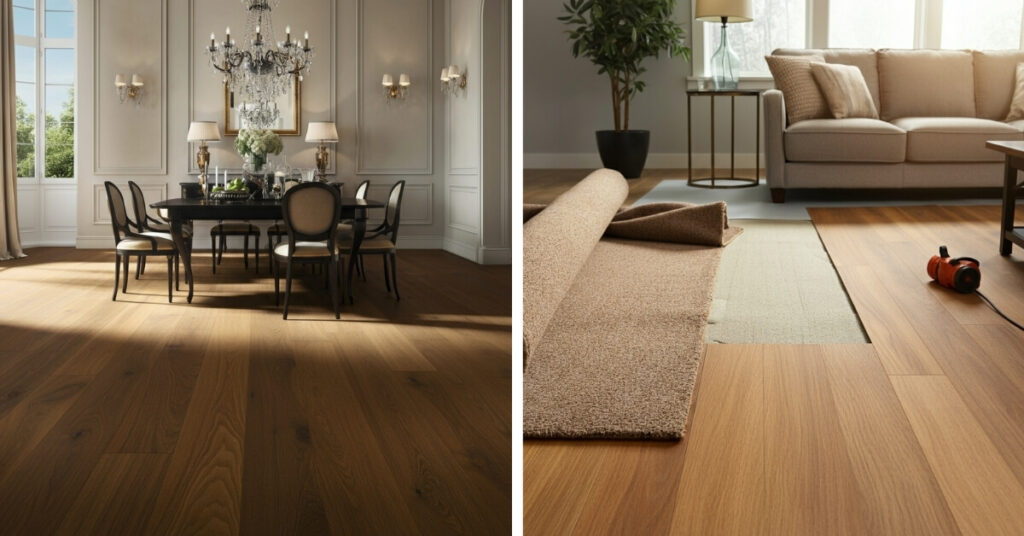
To put it all together, let’s estimate the total cost to replace carpet with hardwood in a hypothetical 200-square-foot living room. Using mid-range pricing, we can create a sample budget.
- Carpet Removal: 200 sq. ft. x $1.00/sq. ft. = $200
- Hardwood Materials (Oak): 200 sq. ft. x $6.00/sq. ft. = $1,200
- Underlayment: 200 sq. ft. x $0.50/sq. ft. = $100
- Labor: 200 sq. ft. x $5.00/sq. ft. = $1,000
- Total Estimated Cost: $2,500
This example provides a general idea, but your actual costs will vary. For a precise estimate, you will need to get detailed quotes from flooring professionals based on your specific material choices and project requirements.
Final Verdict
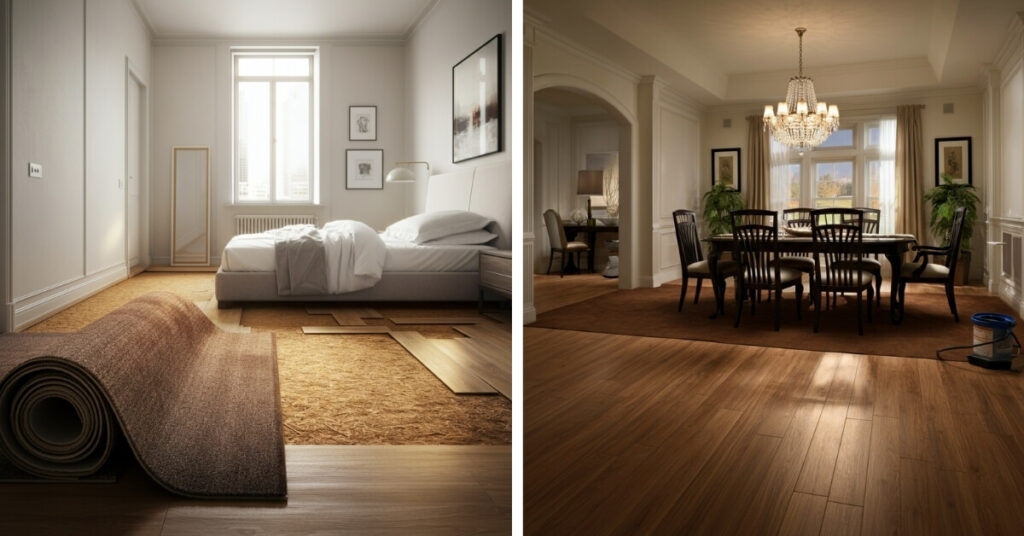
Replacing carpet with hardwood is a significant home improvement project that can boost your property value and enhance your living space. By understanding the various costs involved, from materials and labor to removal and preparation, you can plan your budget effectively. Take your time to research different hardwood options and get multiple quotes from reputable contractors to ensure you get the best possible result for your investment.
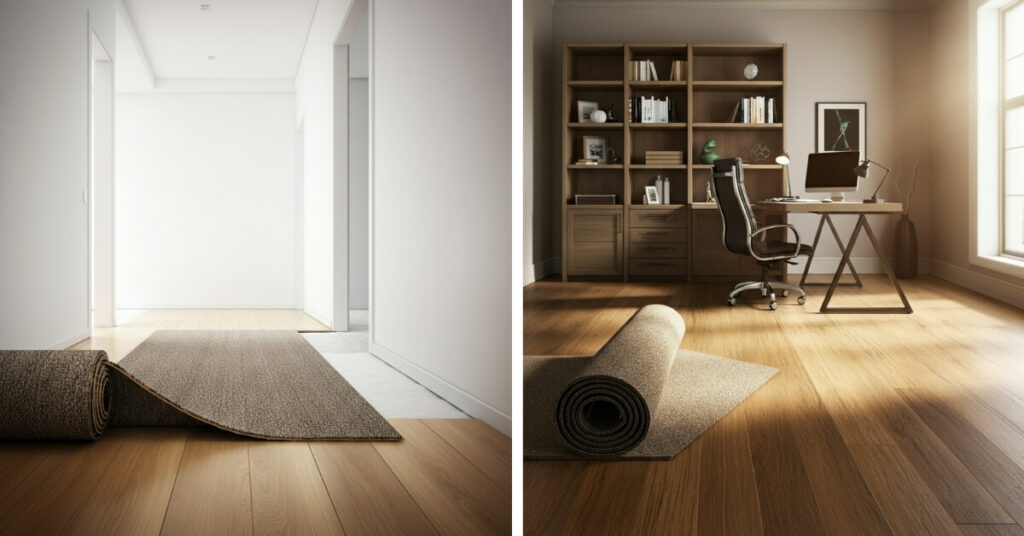
With careful planning, you can transform your home with beautiful, durable hardwood floors that you will enjoy for many years to come. This upgrade not only improves the look and feel of your home but also offers practical benefits like easier cleaning and better air quality.
Frequently Asked Questions
1. Is it cheaper to replace carpet with hardwood myself?
Yes, you can save a significant amount on labor costs, which typically range from $3 to $8 per square foot, by doing the installation yourself. However, it requires specialized tools and skills, and mistakes can be costly to fix.
2. Does replacing carpet with hardwood increase home value?
Yes, hardwood floors are a highly desirable feature for homebuyers and can increase a home’s resale value by up to 2.5%, according to many real estate experts.
3. How long does it take to replace carpet with hardwood flooring?
For a single room of average size (around 200-300 square feet), the process of removing the old carpet and installing new hardwood floors typically takes 2 to 3 days.
4. What is the cheapest hardwood flooring?
Generally, engineered hardwood is less expensive than solid hardwood. Among species, common domestic woods like oak, maple, and hickory are typically more affordable than exotic woods.
As an Amazon Associate, I earn from qualifying purchases.

